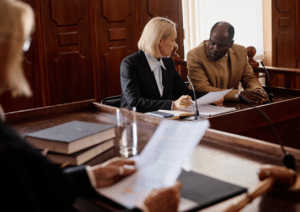Plea bargains—when a defendant pleads guilty to a lesser charge or receives a more lenient sentence in return for pleading guilty—are quite common in Florida criminal cases. Most plea bargains involve negotiations between the prosecution and the defense, leading to an agreement. However, another type of plea that defendants may consider is called the open plea.
An open plea is quite different from a negotiated plea. It’s an option defendants sometimes choose when the prosecutor isn’t willing to deal or makes an unacceptable offer. In such a situation, the defendant can plead guilty or no contest with the idea of saving the state the time and expense of a trial in return for consideration of (hopefully) lenient treatment from the judge. So it’s not a bargain or deal like you’d make with a prosecutor with an assured outcome. It’s kind of like rolling the dice when you don’t have any better options—because the judge doesn’t have to go easy on you.
Making an open plea can be a risky strategy because you are basically throwing yourself at the mercy of the court and hoping for the best. But there are times when it makes sense. The key is to have an experienced and aggressive criminal defense attorney who knows the court system and has an idea of when an open plea is likely to provide the best possible outcome under the circumstances.
Benefits and Risks of an Open Plea Deal
Among the benefits of choosing an open plea deal is that you’re avoiding the uncertainty of a trial and making your case directly to the judge. Through your attorney, you have the opportunity to present mitigating factors and offer other reasons why you should receive a lenient sentence. Mitigating circumstances can include whether a defendant has cooperated with the government, if the defendant requires specialized treatment for a mental disorder unrelated to substance abuse or addiction, if the defendant was acting under duress, or has a substantial impairment in understanding the criminal nature of their conduct or the consequences of their actions.
Also, your attorney can make a motion for a downward departure, making the case that you deserve a lesser sentence than called for in Florida sentencing guidelines. A downward departure motion involves presenting factual arguments, legal reasoning, and relevant case law to support the request for a lower sentence. If the court determines that there is sufficient legal justification and supporting evidence, you may be eligible for a reduced sentence.
Among the risks is that without a specific agreement with the State, the judge has the power to impose any sentence within the statutory limits for the charges you are facing. This means that you could potentially receive a harsher sentence than what may have been offered in a plea agreement.
Making an Informed Decision
It is crucial to understand the potential risks and benefits of an open plea, as well as the process involved. Consulting with an experienced criminal defense attorney will provide guidance and support throughout the entire process.
Every case is different with its unique circumstances, and the outcome of an open plea depends on an individual’s situation. By working closely with your attorney and presenting a compelling case to the judge, you can increase your chances of receiving a fair and favorable sentence.
An Orlando Criminal Defense Attorney Can Help
Your best chance for a successful open plea is with a skilled criminal defense lawyer. The Orlando criminal defense attorneys at the Rivas Law Firm have over 120 years of combined experience and are committed to working for the best possible outcome for our clients. Call 407-644-2466 today.










